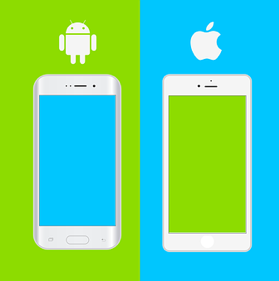When choosing where to develop your mobile application, there are two major platforms and operating systems that most businesses use: iOS and Android. Both of these operating systems have their own strategic advantages, so it’s important to explore the benefits and drawbacks of each before selecting one. The main benefits and drawbacks of each operating system include:
iOS:
Benefits:
- Revenue: Revenue is the most apparent benefit of selecting iOS as an operating system for your application. When you select iOS, your application will get access to Apple’s extremely valuable user base. The demographics of iOS users is optimal for generating profitability for your app. iOS users are generally located in North America, Europe and other parts of the western world. Their high levels of engagement on apps coupled with their affluent socioeconomic backgrounds make them an ideal user base for any app.
- User interface/design: With design and UI, developers for your app do not need to create something from scratch. Apple provides iOS developers a detailed guide for how to choose the user interface for an app. This guide provides an array of options for developers and saves significant time and money that would’ve otherwise been spent designing a user interface.
Some of the drawbacks of iOS include:
- Limited customization: besides the features given to iPhones by Apple, there’s little an app developer can do to add more functionalities and features.
- Storage limits: iPhones come with a hard ceiling for storage when a user buys one. An iPhone user with 16 GB storage may not be able to use your application if it takes up significant storage space.
Android:
Benefits:
- Openness: Android’s open system is one of the most beneficial aspects of selecting its operating system for developers. With Android, there’s many options that developers have to customize their apps that are generally restricted when using iOS. This customization also comes with the numerous designs that Google provides when making user interfaces
- Production: When a mobile application is finished being developed, Android allows developers to publish their app on Google Play much easier than when they use iOS to publish an app. With iOS, there’s much more regulatory guidelines to follow due to Apple’s closed ecosystem. A new iOS update on iPhones may require significant changes in your application before it even hits the market.
- Market share: Globally, Android dominates many markets in comparison to iOS. As of March 2020, Android has over 70% market share for all mobile devices internationally, while iOS has just above 29%. Some markets have virtually all Android run devices which makes it a great opportunity for specific applications. Any application with global ambitions will require to have an Android version of its application.
Some drawbacks of Android include:
- Malware: Since Android isn’t as restrictive as iOS, there are many more opportunities for malware to enter a user’s phone. This is virtually non-existent in iOS devices
- Inconsistency: Android users’ experience of an app can vary greatly depending on the type of device. A newer phone like a Samsung Galaxy can have a much better user interface in comparison to older Android phones.
If you’d like more information on how to select an operating system for your mobile application, talk to an expert here.
YOU MAY WANT TO READ THE 5 MUST-HAVES FOR CUSTOM SOFTWARE DEVELOPMENT.
You may also want to read:
How to make different Software Applications communicate.
Does your business need Software Integration?
What can Machine Learning do for your business right now?
Does your business really need a Mobile App?






